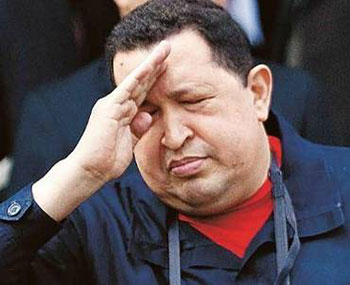Great revolutionary leaders never die. They are immortalized in the hearts of the people they have served. As Aleida Guevara, daughter of Che Guevara, put it: “My father lives in a mountain of people.” So it is with Hugo Chavez, the phenomenal socialist president of Venezuela who died from cancer on March 5, to be mourned by the millions of people all over the world who revered and admired him.
As the most popular President of Venezuela for the last 14 years, Chavez’s accomplishments were legion. Not only did he transform Venezuela into a socialist welfare state overnight, but he also led the Latin American Revolution on a continental scale – a revolution which liberated 12 countries in the region from U.S. imperialist domination. This accomplishment made Chavez an international hero to people in the Global South and North, who looked to him as an example and inspiration in their struggle against Western neocolonialism.
Since its inception, Venezuela had been dominated by a rich white élite descended from Europeans who ruled over a poor indigenous, mestizo, and Afro-Venezuelan majority. This U.S.-backed élite monopolized wealth and power and kept more than 50% of Venezuelans mired in poverty even though their country had become the world’s fifth biggest oil producer. With Washington’s support, the Venezuelan upper class proved to be one of the most corrupt in the world, looting the country’s oil wealth for 40 years. When the people protested, they were killed, as in the Caracazo massacre in 1989 when security forces slaughtered 3,000 people. Because of this brutal repression and imposed poverty, a popular movement arose and spread, eventually electing Hugo Chavez the country’s President in 1998. Chavez then launched the Bolivarian Revolution, which turned out to be the forerunner of the broader Latin American Revolution.
A former army colonel, Chavez came from a poor family and was part indigenous and part Afro-Venezuelan. He was elected President four times, and by the largest majority in 40 years. Including regional contests, the Chavez government won a total of 16 elections. Determined to end what he called the reign of “savage capitalism,” Chavez redistributed Venezuela’s wealth by massively expanding free health care and education, and through land reform and public subsidies. These social reforms angered the United States, which tried three times to get rid of him – once through a failed military coup, then through fomenting an oil strike and other economic attacks, and then by a bungled assassination attempt.
Before Chavez, more than half the people in Venezuela lived in poverty, a figure that he had succeeded in reducing by half before his death. He instituted free universal health care and free education, raising the country’s literacy rate to an astonishing 100%. He implemented land reforms and created government supermarkets which cut the cost of food by 40%. Before these major social improvements, 70% of Venezuelans had no access to basic medical care, and 40% of them were illiterate. Chavez also increased the minimum wage by more than 600%, reduced unemployment from 20% to 6%, and moved Venezuela up four positions in the United Nations Human Development Index.
The Chavez government’s land reform program, called Mission Zamora, promotes equitable land ownership and food security. Seventy percent of the land in Venezuela is owned by only 3% of the people, who often leave it unused. For this reason, the country has had to import 70% of its food needs. Mission Zamora has broken up idle large landed estates, called latifundios, and redistributed 3.4 million acres of land to 15,000 peasant families, as well as set up 50,000 co-operatives for the new owners. These steps have boosted food production and started Venezuela well on the path towards food self-sufficiency.
As Dr. Maria Paez Victor, a Venezuelan-Canadian sociologist, explained to me: “It is not just Chavez, it is Chavez with the people of Venezuela.” The massive success of the Chavez government can be explained by the fact that it is an instrument of the poor majority in Venezuela, who have risen to claim their country and its resources. So, along with health care, education, land and food, the Bolivarian Revolution literally gave power to the people and Chavez became the first ruler in Venezuela’s history to ensure the participation of the poor in politics.
With CELAC, UNASUR, the Bank of the South, PetroSur, and ALBA, an entirely new socialist-oriented continental economy is being created. This economy does not function according to capitalist market rules, but rather responds to the development needs of the Latin American people.
The Chavez government triumphed over U.S. imperialism because it organized the Venezuelan people to defend the gains of the Bolivarian Revolution. As President Chavez said in 2009: “Ten years ago, the Bolivarian revolution arrived in Venezuela, pushed forward by a powerful popular movement, and we have ten years of resisting aggressions — terrorism, sabotage by the U.S. empire — yet here we are on our feet and prepared to survive 100 more years of aggressions if we have to.”
Source:Global Research
M.D

